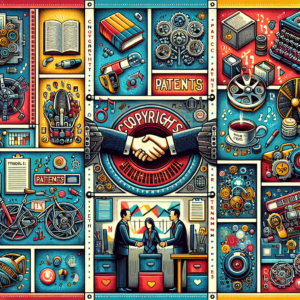Revolutionizing Copyright: Bold Reform Proposals That Could Change Everything
[caption id="attachment_35119" align="alignnone" width="634"] Intellectual Property[/caption]
In an era defined by rapid technological advancements and the proliferation of digital content, the existing framework of copyright law is increasingly being called into question. As creators, consumers, and industries navigate the complexities of intellectual property rights, the need for reform has never been more pressing. This article explores the current landscape of copyright law, the case for reform, innovative proposals, and the potential implications of a transformed copyright system.
Understanding the Current Landscape of Copyright Law: Challenges and Limitations
Copyright law, established to protect the rights of creators and incentivize innovation, faces significant challenges in the digital age. The traditional model, which grants exclusive rights to authors and creators for a limited time, often fails to account for the realities of online sharing and distribution. Issues such as piracy, unauthorized use, and the difficulty of enforcing rights across borders have led to a landscape where many creators feel their work is undervalued and inadequately protected. Furthermore, the complexities of copyright law can create barriers for emerging artists and small businesses, who may lack the resources to navigate the legal intricacies. As a result, the current system is increasingly viewed as outdated and in need of a comprehensive overhaul.
The Case for Reform: Why Traditional Copyright Models Are No Longer Sustainable
The traditional copyright model, which has remained largely unchanged for decades, is increasingly seen as unsustainable in the face of technological evolution. The rise of the internet and digital platforms has transformed how content is created, shared, and consumed, rendering many aspects of existing copyright law obsolete. For instance, the concept of "fair use" is often misinterpreted or inadequately applied in the digital context, leading to confusion and disputes. Additionally, the lengthy duration of copyright protection can stifle creativity and limit access to cultural works, particularly for educational and non-profit purposes. As the landscape continues to evolve, it is clear that a reimagined approach to copyright is necessary to foster innovation, protect creators, and ensure equitable access to content.
Innovative Proposals: Exploring New Approaches to Copyright Protection and Enforcement
In response to the pressing need for reform, a variety of innovative proposals have emerged that seek to redefine copyright protection and enforcement. One such approach is the implementation of a "Creative Commons" licensing system, which allows creators to specify the terms under which their work can be used, shared, and modified. This model promotes collaboration and encourages the sharing of knowledge while still providing a framework for attribution and credit. Additionally, some advocates propose the establishment of a universal copyright registry that would streamline the process of registering and enforcing rights, making it easier for creators to protect their work. Other proposals include the introduction of a "digital rights management" system that leverages blockchain technology to provide transparent and secure tracking of content usage. These innovative approaches aim to create a more flexible and adaptive copyright system that meets the needs of today's creators and consumers.
Balancing Interests: How Reform Can Benefit Creators, Consumers, and Industries Alike
A successful reform of copyright law must strike a delicate balance between the interests of creators, consumers, and industries. By modernizing copyright protections, creators can benefit from enhanced recognition and compensation for their work, fostering a more sustainable creative economy. At the same time, consumers stand to gain from increased access to a wider array of content, as reform can facilitate the sharing and remixing of creative works. Industries, particularly those in technology and education, can thrive in an environment where innovation is encouraged and collaboration is the norm. By prioritizing a balanced approach, copyright reform can create a win-win scenario that supports the rights of creators while promoting broader access and engagement with cultural works.
The Role of Technology: Leveraging Digital Tools to Enhance Copyright Management
Technology plays a pivotal role in the future of copyright management, offering tools and solutions that can enhance the protection and enforcement of intellectual property rights. Digital platforms can utilize advanced algorithms and artificial intelligence to monitor the use of copyrighted content, identifying instances of infringement and facilitating swift action. Additionally, blockchain technology can provide a decentralized and immutable record of ownership and usage rights, ensuring that creators receive fair compensation for their work. Furthermore, the integration of machine learning can help streamline the licensing process, making it easier for creators to navigate the complexities of copyright law. By leveraging these digital tools, the copyright system can become more efficient, transparent, and responsive to the needs of all stakeholders.
Future Implications: What a Transformed Copyright System Could Mean for Society at Large
The implications of a reformed copyright system extend far beyond the realm of intellectual property law; they have the potential to reshape the cultural landscape and influence societal norms. A more equitable and accessible copyright framework could lead to a flourishing of creativity, as artists and innovators feel empowered to share their work without fear of infringement. This, in turn, could foster a more vibrant cultural exchange, where diverse voices and perspectives are amplified. Moreover, by prioritizing access to knowledge and cultural works, a transformed copyright system could contribute to educational advancement and social equity. Ultimately, the future of copyright reform holds the promise of a more inclusive and dynamic society, where creativity and innovation are celebrated and supported.
As the digital landscape continues to evolve, the call for bold reform in copyright law becomes increasingly urgent. By addressing the challenges and limitations of the current system, exploring innovative proposals, and leveraging technology, stakeholders can work together to create a copyright framework that benefits creators, consumers, and industries alike. The potential for a transformed copyright system is vast, offering the promise of a more equitable and dynamic cultural landscape that fosters creativity and innovation for generations to come.
